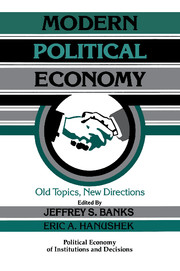Book contents
- Frontmatter
- Contents
- List of contributors
- Series editors' preface
- Preface
- Introduction
- 1 The economics and politics of regulation: perspectives, agenda, and approaches
- 2 Regulatory commitment and utilities' privatization: implications for future comparative research
- 3 The political economy of transformation: liberalization and property rights
- 4 Politics and trade policy
- 5 Elections, party structure, and the economy
- 6 The politics and economics of budget deficit control: policy questions and research questions
- 7 Law, legislation, and positive political theory
- 8 The rational choice theory of social institutions: cooperation, coordination, and communication
- Index
5 - Elections, party structure, and the economy
Published online by Cambridge University Press: 07 May 2010
- Frontmatter
- Contents
- List of contributors
- Series editors' preface
- Preface
- Introduction
- 1 The economics and politics of regulation: perspectives, agenda, and approaches
- 2 Regulatory commitment and utilities' privatization: implications for future comparative research
- 3 The political economy of transformation: liberalization and property rights
- 4 Politics and trade policy
- 5 Elections, party structure, and the economy
- 6 The politics and economics of budget deficit control: policy questions and research questions
- 7 Law, legislation, and positive political theory
- 8 The rational choice theory of social institutions: cooperation, coordination, and communication
- Index
Summary
INTRODUCTION
In 1987 I wrote an article entitled “Macroeconomics and politics” (Alesina 1988a), which highlighted new research in “political macroeconomics.” At that time, this literature was still relatively small: It had developed from applications of game theory to problems of monetary policy. Since then, this field has literally exploded: The “new political economics” is one of the most active areas of research in economics. A major contribution to the development of this field comes from a closer interaction between economists and political scientists.
Recent research in political macroeconomics has covered a large number of topics: political business cycles, the politics of the government budget, the political economy of growth, the politics of inflation and stabilization policies, problems of external debt and capital flight in less developed countries, the effect of institutions (such as the degree of Central Bank independence) and different electoral systems on economic policy, the performance of coalition and minority governments relative to single-party governments, the relationship between domestic political competition and international policy coordination, and the politics of international agreements such as the European monetary system, just to name a few.
Even this incomplete list makes it quite clear that it is impossible to assess the progress and shortcomings of all of this body of research in one essay. Therefore, here I concentrate on two broad issues: the economic and political cycle; the effect of electoral systems and party structure on the economy, with particular reference to the issue of “divided government.”
- Type
- Chapter
- Information
- Modern Political EconomyOld Topics, New Directions, pp. 145 - 170Publisher: Cambridge University PressPrint publication year: 1995
- 9
- Cited by

